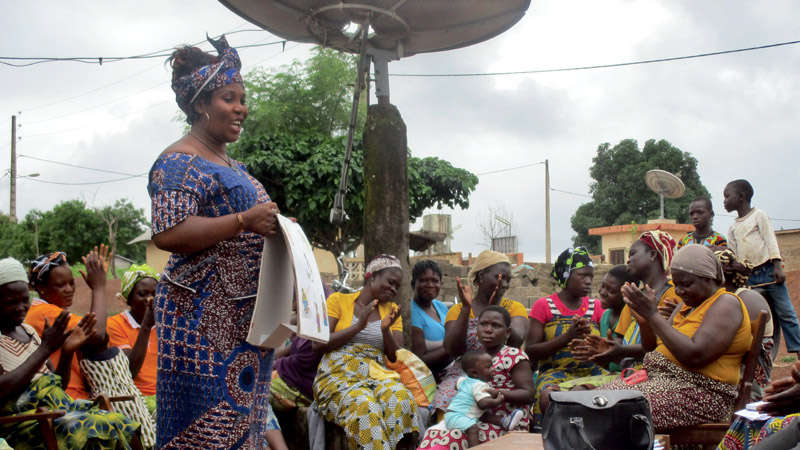Enthusiastic children greet ANCRE staff in Tokplegbe, outside of Cotonou, Benin. Photo credit: URC
Advancing Newborn, Child, and Reproductive Health (ANCRE) Program
The Challenge
Persistent gender and cultural constraints hinder access to and uptake of quality health care in Benin, particularly for services that address the main causes of infant, child, and maternal morbidity and mortality. Lack of integrated delivery of family health services in the public and private sectors and weak adoption of preventive and health-care-seeking behaviors have limited the impact of the Government of Benin’s Package of High-Impact Interventions. Moreover, lack of coordination with the public sector has resulted in uneven quality of care in the private sector, which provides more than 60% of health services.
Overview and Objectives
The Advancing Newborn, Child, and Reproductive Health (ANCRE) Program supported USAID/Benin’s Integrated Family Health Program to improve the quality and coverage of the Government of Benin’s Package of High-Impact Interventions in both the public and private sectors. ANCRE strengthened the capacity of central, regional, and zonal partners to deliver an integrated package of newborn, child, and reproductive health interventions in conjunction with robust management support systems.
ANCRE raised awareness of gender barriers to care-seeking and access to equitable, appropriate services, targeting decision makers, community leaders, health care providers, and male relatives. Through capacity building, supportive supervision, and mentoring, using quality improvement approaches, the project ensured that protocols, procedures, and standards were disseminated and implemented. The project supported health authorities in the 10 focus health zones to lead continuous quality improvement, collaborative learning, and exchange initiatives to improve teamwork and empower health care providers to more effectively use data to improve quality of care and health outcomes.
ANCRE’s community health component placed a strong emphasis on strengthening the capacity of non-governmental organizations and community-based organizations in the 10 health zones, including the capacity to manage community-based health insurance funds. ANCRE supported health zone and facility staff to reinforce the community health worker (CHW) system by mobilizing, training, and supporting CHWs in the catchment areas of health facilities to promote essential family health practices. ANCRE’s social and behavior change communication strategy focused on strengthening communities’ capacities and autonomy in health management; engaging women and men to actively participate in the promotion of health; promoting women’s empowerment through grassroots development initiatives; promoting local health financing mechanisms; and supporting the dissemination of and awareness-building of laws relating to gender-based violence.

In response to the Ebola outbreak in West Africa, ANCRE provided technical and material assistance to the public health sector to improve outbreak response and build the capacity of health professionals to comply with the requirements of the International Health Regulations. The project ensured that priority health facilities had the essential equipment and detection, isolation, and care processes to detect and respond to viral hemorrhagic fevers and strengthened infection control and surveillance systems.
Achievements
ANCRE helped sensitize and educate private health providers on national registration and licensing regulations and encouraged unauthorized facilities to comply with national regulations to improve the quality of their services. More than 450 private facilities were registered and over 600 private providers were licensed by the Ministry of Health (MOH) between 2015 and 2017. By the end of the program, 79% of the 276 authorized private health facilities in the 10 health zones offered quality family planning (FP) counseling. With support from ANCRE, Benin’s private health sector platform (PSSP) signed a memorandum of understanding with the MOH in 2017, which resulted in stronger collaboration between the two bodies and more visibility for PSSP.
Quality improvement (QI) teams were integrated into the 10 health zones management system and were formed in 97% of project-supported facilities. The QI teams focused on improving completion of four antenatal care visits, active management of the third stage of labor, FP, and growth monitoring. The practice of active management of the third stage of labor increased from 54% of deliveries in 2015 to 83% in 2018. Commodity stockout rates at the health facility level dropped from 73% in 2015 to 12% in 2017.
In 2015, ANCRE introduced the mobile application “CommCare” to strengthen CHW capacity in two health zones. Linking 270 CHWs to their health center with mobile Android phones, CommCare allowed CHWs to register children under the age of five, provide a consultation, and refer them as needed; provide FP counseling; monitor pregnant women and newborns; manage stock; track contacts of Ebola cases; and share health information with head nurses. Using CommCare, over 9,000 children were registered and provided with community-level care or referred.